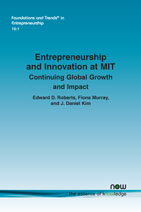Entrepreneurship and Innovation at MIT: Continuing Global Growth and Impact—An Updated Report
By Edward B. Roberts, MIT Sloan School of Management, USA, eroberts@mit.edu | Fiona Murray, MIT Sloan School of Management, USA, fmurray@mit.edu | J. Daniel Kim, MIT Sloan School of Management, USA, jdkim@mit.edu
Abstract
This study analyzes the economic impact of MIT alumni-founded companies and highlights the key trends in the MIT entrepreneurial ecosystem between 1950 and 2014. Based on a large-scale survey of all living MIT alumni in 2014, this study is a major update to Roberts and Eesley (2011). It systematically characterizes alumni engagement in the broader innovation ecosystem through not only starting new companies, but also patenting, investing as angel investors, and joining startup firms as early employees. We highlight the role of foreign-born students as entrepreneurs and innovators as well as key trends in the alumni-founded ventures’ industry composition, firm performance, and economic impact through job creation and sales. Based on the lessons from MIT in the past 60 years, we discuss various implications for university leadership for designing and implementing educational curricula and programs that address the evolving nature of alumni entrepreneurship and innovation. Lastly, the appendix describes our methodological approach to extrapolating survey results and contributes to the literature on survey-based research methods.
Entrepreneurship and Innovation at MIT: Continuing Global Growth and Impact—An Updated Report
Entrepreneurship and Innovation at MIT: Continuing Global Growth and Impact updates an earlier survey (Entrepreneurial Impact: The Role of MIT) to explore the continuing contribution of MIT alumni to innovation and entrepreneurship in the United States and worldwide. This update is particularly salient given the burgeoning interest in the role of universities in economic growth and the fact that students who graduated between 2004 and 2014 faced a more difficult economic climate. On the one hand, fund raising and capital access became more challenging as the U.S. economy entered a period of deep recession starting at the end of 2007, and venture capital assets and investments declined. On the other hand, entrepreneurship concurrently became a potentially more appealing career choice due both to structural and perceptual changes in traditional employment and occupations, as well as to an apparent groundswell in young people’s interests in entrepreneurial endeavors. Overall, our new findings indicate that MIT alumni are engaged in entrepreneurship and innovation at ever increasing rates, and at earlier and earlier stages in their lives.

Companion
Entrepreneurial Impact: The Role of MIT , Foundations and Trends® in Entrepreneurship, Volume 7, Issue 1-2 10.1561/0300000030